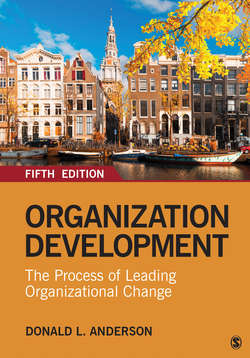Читать книгу Organization Development - Donald L. Anderson - Страница 58
На сайте Литреса книга снята с продажи.
Challenges to Holding Organization Development Values
ОглавлениеSchein (1990a) and Church et al. (1992) see tensions and challenges to the practitioner in holding to the values described above:
1. Financial and economic tensions. OD practitioners are frequently either external consultants needing to sell clients on an approach or internal practitioners working with managers of the same organization. In either case, it is easier to describe approaches to solving a problem than to engage in a philosophical statement about values to a potential client. External consultants making a living in OD may find it easier to talk with clients about OD techniques versus holding nebulous values-based dialogues. They may decide to accept an engagement that does not fit with their values over declining the invitation of a paying client. Church et al. (1992) refer to this as a “tension of being driven by ego gratification, personal success, and financial rewards versus championing traditional humanistic values in the consulting process” (p. 20).
2. The push to see OD as technology. OD practitioners find it tempting to quickly and arbitrarily use favorite tools or the latest technique in an attempt to be cutting edge. Businesses and consulting practices have evolved that promote specific OD techniques so that both consultants and clients may be enamored with a popular approach or a sales pitch. In any case, the excitement over a new technique may overshadow the values on which it is based or the necessity of implementing it in the first place. Margulies and Raia (1990) write, “Many practitioners have become routine in their applications; they have succumbed to management pressure for the quick fix, the emphasis on the bottom line, and the cure-all mentality. . . . They seem to have lost sight of the core values of the field” (p. 38). Many students and new practitioners of OD in particular become enamored with books outlining “101 new OD interventions” without full knowledge of when and why they would be applied.
3. Management culture and expectations. Speed and productivity are key values of business culture in the United States. Managers seek rapid solutions to immediate problems and want to be able to quantitatively prove the value of spending money on a consultant. A consultant who spends time with surveys, conducting interviews, giving feedback, or facilitating meetings may appear to be producing very little and taking a long time to do so. This culture of productivity and expectations of speed pushes OD practitioners away from the rigor of values-based diagnostic processes and into rapid discussions of solutions and intervention programs. This creates a “tension between projecting one’s own values and normative beliefs onto client organizations versus being only a facilitator for serving management’s interests” (Church et al., 1992, p. 20). Managers may see a practitioner who discusses values as out of touch with contemporary organizational challenges.
4. Research. Academic research projects that sought to compare and contrast methods and techniques used in OD work have pushed practitioners to see OD (and the field to evolve) as a set of techniques that resulted in certain outcomes rather than to examine whether those techniques appropriately applied the core values of the field (Schein, 1990a).
